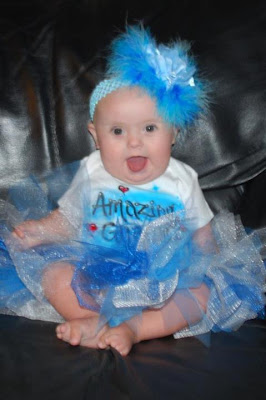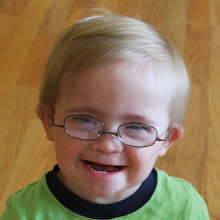Have you read the book? Try reading it out loud. Makes me a bit emotional. Why? Let me tell you about the book.
In a nutshell, it's written from the perspective of a 6yr old girl about her baby brother who has Down syndrome. She kept asking her dad, of the wonderful things she had planned to do with her brother, which would he not be able to do? Ultimately, there wasn't anything she had planned for her brother that he wouldn't eventually be able to do.
Most of us enter this journey of Down syndrome with many people telling us what our child will NEVER be able to accomplish. We need the perspective of a 6yr old with the right priorities. Her plans with her little brother didn't include him becoming president. Or walking on the moon. I mean, how many of us are going to have "typically-developing" children who are going to accomplish those things? What infuriates me is that there are doctors out there who are STILL telling parents that their child with Down syndrome won't be able to ride a bike. Or go on vacation. Or live independently.
In the book, Emma was just looking forward to the simple things of having a baby brother. Would he eat fruit snacks in the back seat of the car? Would he play kickball? Would he go on vacation with them? One of the most difficult things for me to deal with when expecting Micah was my thought that Nathan was getting ripped off... that he wouldn't have a brother to throw a ball with, etc. But Nathan LOVES playing ball with Micah. He makes up fun games to play with him. If you ask him what Down syndrome means, he will tell you that it means they grow more slowly than other people. He doesn't care about extra chromosomes.
I read the book, "We'll Paint the Octopus Red," to Nathan's Kindergarten class this morning (I was the "mystery reader"). Then we did some activities. Here was my outline:
* Introduction
* Read the book
* Tell a bit about Down syndrome (we have lots of cells and you all have 46 chromosomes in each cell and Nathan's brother has 47)
* How does that make kids with Down syndrome a bit different from you?
* Sometimes they have to work a little harder to do the same things that you do. I asked for volunteers to write their names on the white board. Then I put a thick sock on their hands and asked them to write their names again.
* I had everyone in the class find a buddy. They put a marshmallow on their tongues and tried to say something the other person could understand.
* Even though kids with Down syndrome have some things that are different from you, they're mostly the same as you. (I asked them things like, "Do you like to play ball? So does Micah!")
* Though Micah might take a bit longer to do the same things that you do, he's more like you than he is different.
That's it. Not too hard. I got my motivation from
Laurie.
Next time, I'll only do a few kids with the marshmallows because it was kind of crazy in there with everyone trying to talk at the same time.
Also, after the kids wrote their names on the white board, I asked if it was easier or harder with the sock on their hands. They said easier (because they're Kindergartners, and they think they can make everything easy). I then reminded them that it took them a lot longer to write their name as well with the sock on as without.
It was lots of fun. And here's the feedback I received in an email from Nathan's teacher today:
Thank you for reading to the class today. We talked a little more about the book after you had left and I asked the class what they thought you wanted them to learn. Several of them shared that we should be nice and kind to all people even if they are a little different in some way. They brought up how Martin Luther King thought everyone should be treated equal and said that it was the same thing. Thank you for sharing with them! :)


























